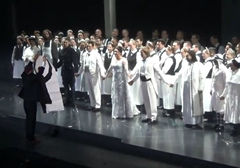| Opera Articles | 26 April 2024 |
| Protests at the opera by Steve Cohen |
|
| The very public protest on the Met stage after a performance of Iolanta raises the question as to whether world issues and art should be totally separate | |
|
At the end of the Metropolitan Opera’s new production of Tchaikovsky’s Iolanta on January 29 a man from the audience made his way onto the stage as soprano Anna Netrebko was leading a cast bow and held up a sign equating Vladimir Putin with Hitler. The intruder walked into the wings where he was arrested and charged with criminal trespass. The charges were subsequently dropped. The point of the demonstration was that Netrebko and the conductor Valery Gergiev publicly supported Putin on several issues, including Russia’s annexation of Crimea and aggression against Ukraine. Both of them signed a public letter in support of Putin’s stance in these and Netrebko posed for a photo with a separatist leader holding the flag of the pro-Russian organization. The reaction of the Met audience at that performance was hostility towards the protester. They gasped and booed when he appeared and applauded when he was hustled off. It appeared as if Met patrons want the sanctity of their temple to be undisturbed. A majority of Americans oppose Putin's policies, yet the Met audience was angered by the protester's appearance. But should world issues and art be totally separated? No one would deny Netrebko and Gergiev the right to hold their own opinions. Yet they used their celebrity status to support Putin, thus trumping the positions of other folks. Their high visibility gave their opinions greater impact than the average person’s and therefore some who oppose Putin’s actions sought to balance the scale and attract comparable attention. You could argue that neither the soprano nor the conductor expressed any political opinion from the stage of the Met so, logically, the protesters should not have come into the opera house. But holding placards outdoors could not make as big an impression as did Netrebko’s and Gergiev’s support for Russian separatists (or aggressors, depending on your view) . The protester did not interrupt the music but, instead, waited until the moment when Netrebko was receiving applause and when her supporters were throwing bouquets on to the stage. She used her star status to further Putin’s cause, protesters say, so why shouldn’t someone use Netrebko’s celebrity to help the other side? And the man refrained from saying anything; he just held up a sign. An analogous situation existed in 1939 when Beniamino Gigli returned to the Met after an absence of several years. An Italian citizen, Gigli publicly expressed enthusiasm for dictator Benito Mussolini who had signed an alliance with Nazi Germany. No demonstrations against him were reported in the press. But the climate changed later as Americans regretted that there had not been enough public outcry against Fascism and Naziism. Kirsten Flagstad chose to spend the war years in her native Norway with her industrialist husband who was a Nazi sympathizer. When she returned to the USA, protesters marched outside concert halls and disrupted some of her concerts with shouting. Similarities end there because, unlike Netrebko, Flagstad never appeared with political or governmental leaders nor expressed any political opinion. Previously, Netrebko and Gergiev angered human rights activists when they refused join critics of the Russian law that allows police to arrest people they suspect of being gay or "pro-gay." The British Independent asserted that Netrebko and Gergiev should have expressed support for human rights when they starred in Eugene Onegin by the gay Tchaikovsky in 2013: "What a moment for Netrebko and Gergiev to speak from the stage at the curtain call and make clear their feelings about anti-gay legislation in their homeland." At the Onegin opening night a ticket-holder shouted: “Anna, Valery, your silence is killing Russian gays!” Other patrons shushed him. Met staffers asked demonstrators to leave, which they did. Met general manager Peter Gelb says that he has taken steps to stop any similar demonstrations. We wonder whether the Met, by so doing, is supporting Putin's side. When the Iolanta incident took place a radio broadcast was in progress and the commentators ignored it. Independent journalists, under those circumstances, might have announced what the sign said and described the reactions to it. Yet the broadcasters seemed as if they wanted to hush things up as, indeed, Gelb does. On the other hand, they may feel that they didn’t understand the issues and therefore refrained from making any comments that could have been erroneous. Or, perhaps, they felt that art and politics can not mix. Meanwhile, rumors spread among some Met attendees that Met staffers might have abetted the protester. How else could a man with a large sign have gotten past the security-search at the entryway and, later, onto the stage? On February 14 the opera will be broadcast on radio and telecast in movie theaters worldwide. It will be interesting to see if anyone tries to make a political point with so many people watching and listening. And how vigilant will the Met's security force be? |
|
| Text © Steve Cohen |

 Are political demonstrations at the opera to be applauded or deplored? The handling of a recent protest is causing almost as much controversy as the political issues that inspired it.
Are political demonstrations at the opera to be applauded or deplored? The handling of a recent protest is causing almost as much controversy as the political issues that inspired it.






